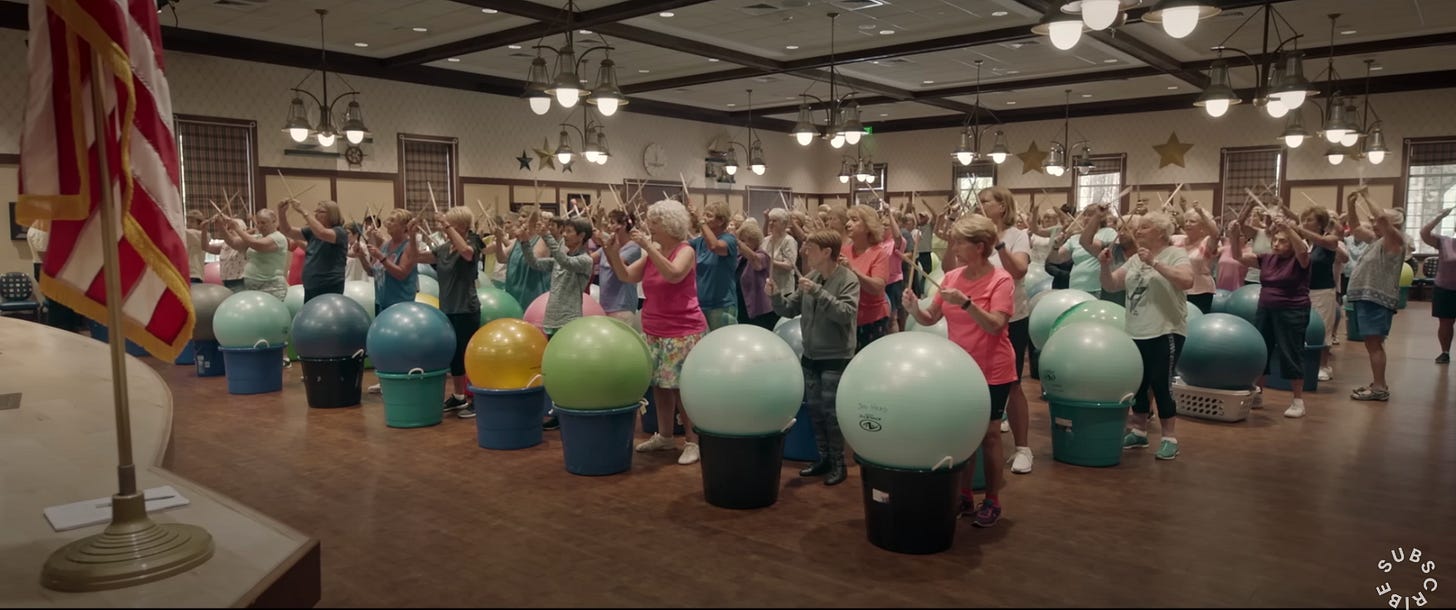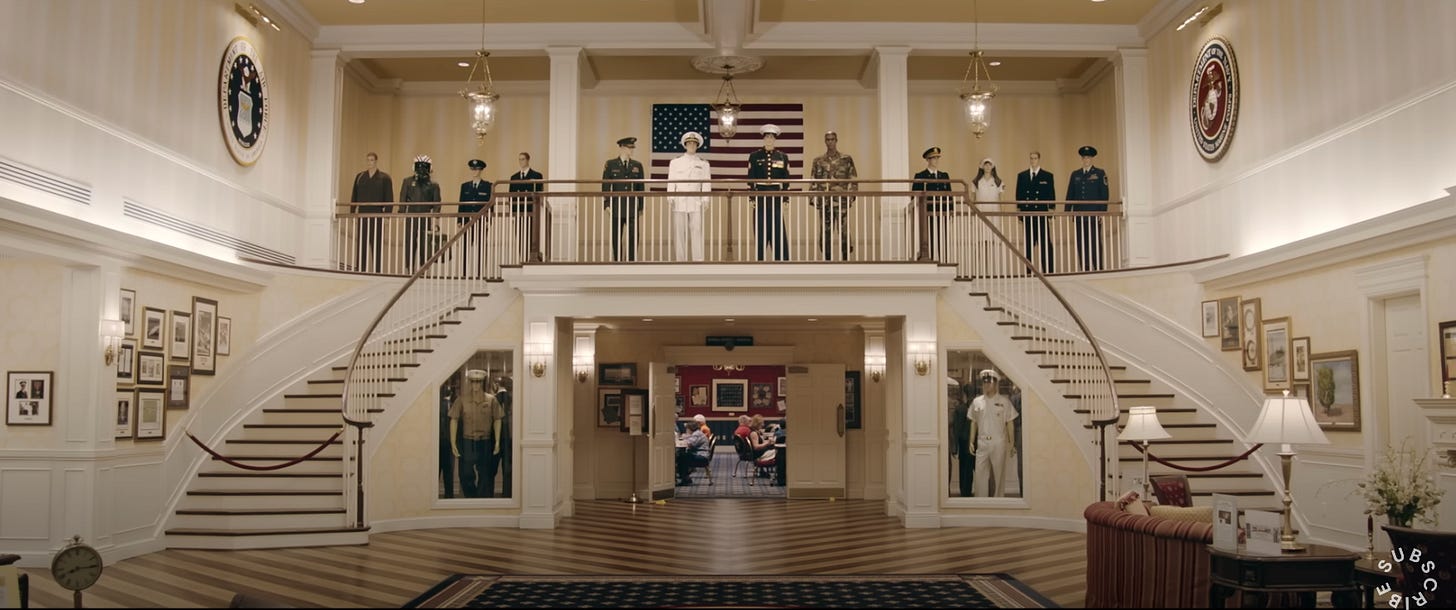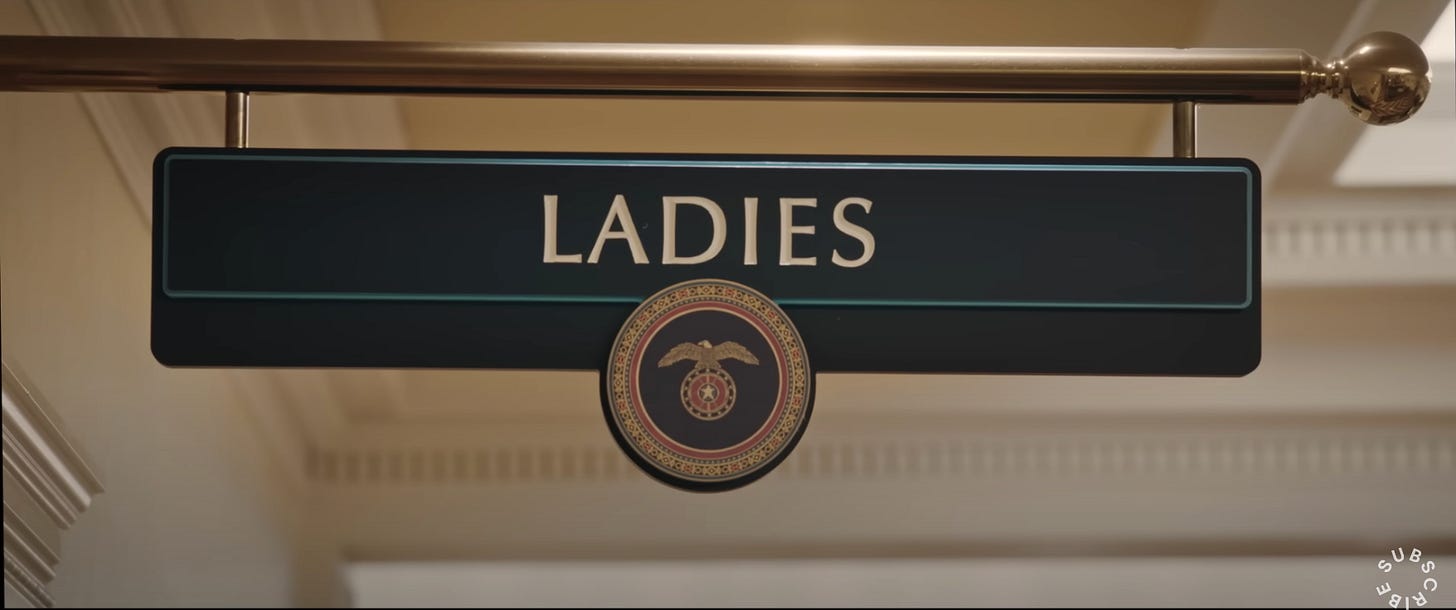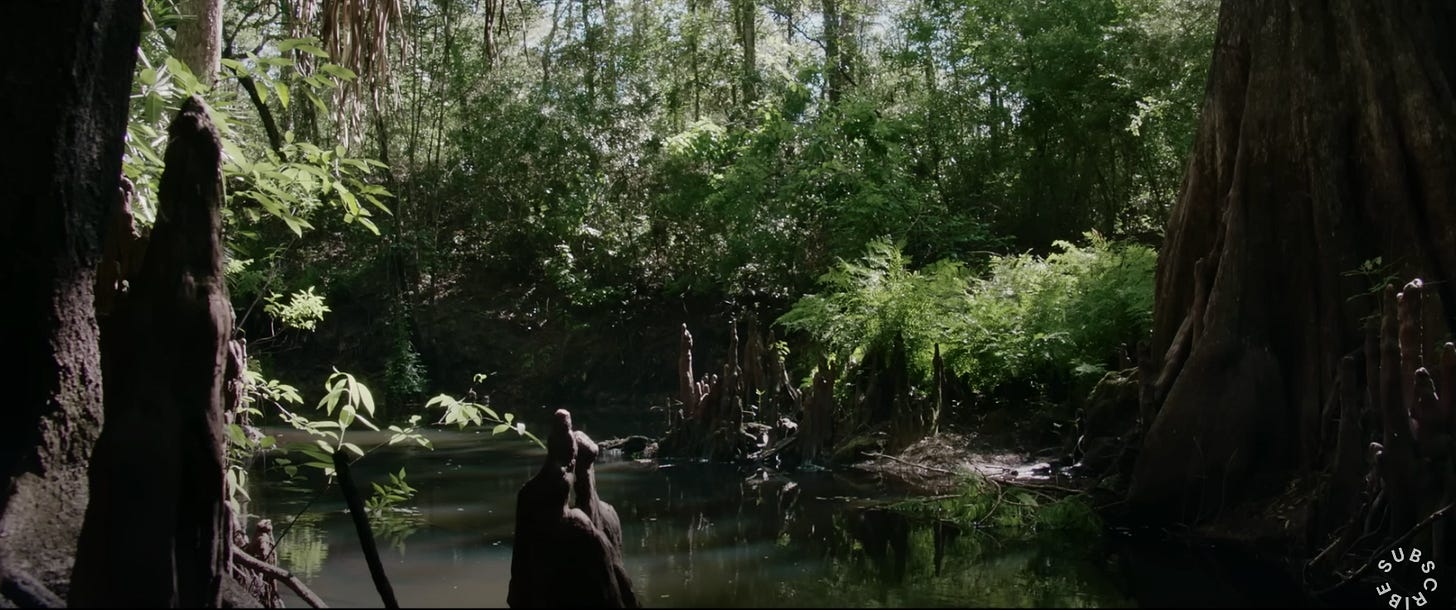I stumbled upon The Bubble this afternoon. The title of the Youtube video - ‘Golf, Booze & Guns: Inside Boomer Paradise’ - was pure clickbait. The thumbnail was an image of old white men wearing red and saluting. At most, I was expecting a one-sided anecdote about a hedonistic retirement community.
Instead, I found a fascinating, beautiful documentary that offers a nuanced perspective on one of the largest retirement developments in the United States. There’s a shocking amount of depth in this documentary, and it touches on themes that I’ve been thinking a lot about recently - aging, disconnection, retirement, phases of life, and more.
Context
The Villages is a ~150,000 person 55+ community in central Florida that spans 3 counties. It was started in the 1970’s but took off in the early 90’s and has seen explosive growth through the 2000’s.
The Villages’ calling card is a fun, active lifestyle for residents. I don’t have data on this, but the documentary implies that most residents come from up north to live the Florida lifestyle. It’s reasonably affordable - The Villages’ website quotes rates as low as $800 per month for amenities, utilities, and a mortgage, though there are no doubt many mechanisms to part residents from their money. Residents get access to golf, pickleball, dancing, music classes, parades, shooting, karaoke, and more. There are many restaurants, bars, and shops that cater to residents. It even has its own radio station and newspaper. In total, it’s a one-stop-shop for an ideal Florida retirement.
The growth of The Villages has had a massive impact on the surrounding community. Development has turned forest, swamps, and wetlands into houses and golf courses. This has had major environmental consequences (e.g., massive water usage, insufficient drainage, carbon emissions) and changed the demographics of multiple counties (The Villages is populated by almost exclusively white retirees). Many locals are very unhappy with the changes, while others are thankful for the economic growth The Villages brought to the area.
It has also changed the political landscape of these counties and the state of Florida. Locally, The Villages is now the largest voting block in each county it occupies. Nationally it’s an incredibly strong Republican base (according to the documentary, Villages residents donated more to George W. Bush’s campaign than any municipality in the country).
That’s a startling amount of impact for what appears to be a staid retirement community.
Disconnection
“Our daughter is two hours away, which we think is the perfect distance. We don’t get those calls that say ‘can you come babysit tonight’. She has to plan in advance. A lot of children think that when their parents get older, they’re just sitting around waiting for that phone call. We have to fit them in, because there’s so much going on in our lives.
If you’re living close by [to your family], you start to [get neglected]. I think if we were there all the time, they wouldn’t be sad to see us leave. I like that sadness. I’m pretty fond of it.”
I found this quote (at 42:10) to be particularly poignant. For most of the residents profiled in the documentary, escaping their family and community was an explicit reason for moving to The Villages.
Some moved because they could no longer recognize the place they lived for most of their lives. A man from Cincinnati said there was “nothing there for him anymore” - his old home had been torn down and rebuilt, the store he grew up working in was gone, his friends had moved away or died. Others never had a community to begin with. A man said he had moved 18 times in his life for his career, so moving some place new for retirement felt natural.
Others talked about a feeling disregard or disrespect from younger people. No one asked them for advice or sought their help; no one valued their abilities. Being around young people made them feel self conscious of their declining beauty and ability. Moving to The Villages allowed them to escape from a world of judgement and honest self-appraisal.
Others talked about family. The quote above brazenly described the feeling of not being valued by your family in ordinary circumstances; moving away allowed this couple to escape their obligations and reclaim their value as individuals. Another couple described it in almost opposite terms; moving away eliminated any dependency on their children, freeing them to live life as they saw fit.
All three threads are driven by disconnection from place and people. Disconnection from place is part of a longtime trend of spatial abstraction for middle- and upper-class Americans; places have stopped becoming parts of our narrative selves and become objects we use for economic advancement or pleasure. Disconnection from people is driven by a lack of respect for the elderly, which stems from the belief that someone’s value is equal to what they can produce (and no more). Both exacerbate the decline of already weakened family structures.
Add the Boomer generation’s strong belief in self-reliance and focus on pleasure, and it’s no surprise that people would choose to spend their twilight years drinking and playing golf in central Florida, rather than raising their grandkids.
Community
“These are folks who have a very clear idea of society, and what it should be. Where their place is in it. It matches perfectly with what the developers provide them.”
There was a sharp contrast between the resident’s disconnection and their stated love for community. There are shots of hundreds of people in meeting halls and churches; neighbors gathered on a front lawn for a lunchtime conversation, sharing drinks and stories. All residents expressed a strong love for their country and a desire to see it move in a different direction.
This spirit is so at odds with the lifestyle they chose to live. Instead of investing in the future or spending their twilight years doing something to better the country they claim to love they are partying, golfing, eating out. Spending their fortunes on themselves. As one YouTube commentator aptly put it:
“A society grows great when old men plant trees whose shade they know they shall never sit in.”
If so, then perhaps the opposite is also true. A society grows weak when old men plunder trees to build a golf course, whose water table won’t even last the duration of their own myopic vision
This is tragic!
Tragic because these people clearly have something to add to the world. They are smart and well-spoken and have beliefs and skills that could be used to build a better society.
Tragic because their resource allocation sucks - there’s no way their money is better spent on margaritas at age 75 than a nicer vacation at 50 or better clothes for their children in their 40s. Tragic because it’s clearly a subversion of their own values. Tragic because it’s not going to make them happy. Tragic because they’re consuming an enormous amount of resources and doing significant environmental damage. Tragic because the only real difference they’re making is electing Republican politicians.
The residents are the product of a deeply disconnected society. I hope subsequent generations are able to make better choices, but I’m not sure how much has changed. In the director’s words:
“A lot of time, the reason for people to be there [in The Villages] was not that they loved this super homogenous place, but because there wasn’t another option that felt good to them.
That’s something I’d encourage our generation to think about more - what society do we want to build? One where a whole generation feels unwelcome, left out, feels like they can’t be part of it, that they’re unproductive in society? Or a society where we can draw from the experience of a whole generation that otherwise we’ll lose.
This lack of contact between the generations will mean we lose a bunch of experience, and what it means for older people is that they lose contact with younger people that can shake them out of a path they feel comfortable in. I think we need each other to create a successful society.
I would like us to all think about if this is the best we can do. Can we create a more lively, more colorful future for us? We have to think about other structures than monocultures.
Stages and lanes
“It really strikes at the core of how Americans think. America is very invested in the idea that if you work hard, you get a reward.
A lot of the time, if you talk to these folks, the first thing out of their mouth will be ‘I worked my whole life to have fun when I retire’. That’s almost a universal answer.
They feel they’ve done their bit - it’s up to you people outside the bubble to keep an eye on democracy, and keep things rolling. We’re going to be over here, playing our third game of golf this week. They feel entitled to let go.
This is a really common thought - the idea of separating life into different chunks, and living / acting differently in one chunk than you would in a different chunk. People do this with different stages of their life (e.g., working years vs. retirement, college vs. post college) and different lanes of their life (e.g., work vs. family vs. friends).
But life doesn’t work like that. When you live differently in one stage / lane than you do in another, you create ripples. You can’t just be career-focused in your 30’s and be family-focused in your 40’s - your kids won’t forget that you weren’t there for them. You can’t be selfish in your work and selfless in your personal life - your colleagues will remember that you threw them under the bus when it mattered. It all blends together.
If we want to live a certain way or achieve certain things, there’s no ‘later’ date when all of that can come true. Our actions today affect our actions tomorrow; my past selves created my present self.
The idea that your life exists in ‘stages’ or ‘parts’ is a very easy thought. It allows people to say things like:
“I’m in college, so I don’t have to worry about getting a job - that’s for later”
“I’m in the prime of my career, I’m not supposed to be having any fun - that’s for later”
“I’m retired now, so I don’t have to create a better world - I already did that”
“I’m making a work decision, so it’s okay if I pollute that river - I’ll donate to a charity in my personal life”
“I’m out with my friends, who cares if I flirt with a stranger - I’m a faithful husband at home”
This idea is a very effective heuristic, because it allows you to narrow the range of things you have to think about. It also is a great way to excuse behavior that would otherwise be unacceptable. Everyone has done this, and there’s some truth in the idea - different contexts do necessitate different behavior - but most people take it too far. The residents certainly did.
Earlier this year, I wrote something in favor of optimizing your activities around specific end goals, vs. using universalist systems to guide activity in all facets of your life.
Most people do not address this optimization problem directly. Some people simplify the problem by tying one goal to another, thinking “if I’d be wealthy, I’d be happy”. Some rely on universalist life formulas (e.g., a set of religious beliefs) and assume that if they uphold their credos, everything will work out fine. Others center their life around an institution (e.g., a family, a large corporation) and rely on that institution to meet all their needs (i.e., the corporation pays them, gives them greenwashed work for fulfillment, and offers a network of friends). Many do all three. Regardless of the exact mechanism, these sorts of convenient abstractions inevitably lead to sub-optimal outcomes. In my mind, people would be much better served by addressing each goal directly, using the most appropriate model to meet that goal.
I stand by this, but I’m going to alter it. While we should be making decisions with an explicit understanding of what goal we’re trying to achieve, we can’t pretend that actions in service of one goal are somehow separate from actions in service of another. We can’t drift too far away from our center in one domain of our life in service of a specific outcome; if we do, all domains will begin to drift.
It also underscores the importance of living sustainability, in every meaning of the word. We should live our life in a way that we could sustain for years - personally, morally, financially, and environmentally.
Self-denial in the present only works if you avoid creating ‘kickback’ behaviors in the long run. There’s no point building a fortune if you’re going to spend it all on booze in your 80’s.
We never know how much time we have left. Saving pleasure and good works for the future is a recipe for dissatisfaction, if you die earlier than you expected.
Closing thoughts
I really liked this documentary. If you made it this far and haven’t watched it, you should. The cinematography is beautiful and the pace is enthralling. It feels like a fever dream or a cult documentary. Some shots I liked:












